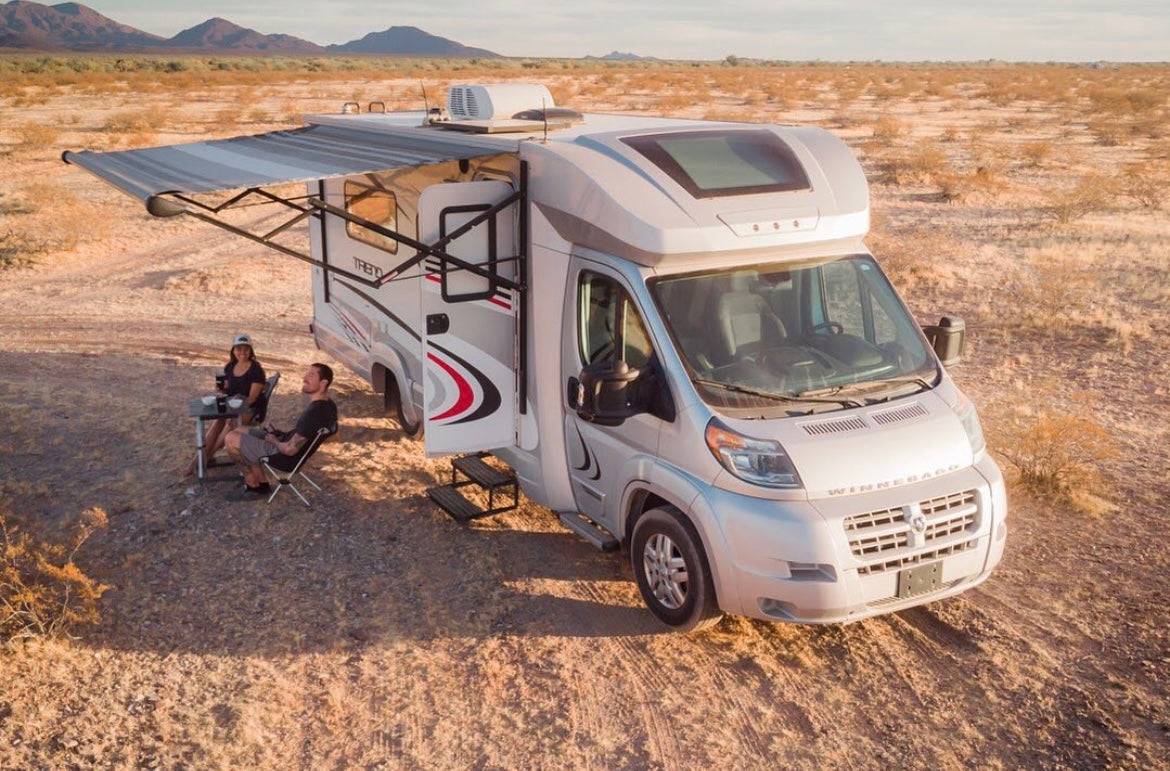When it comes to hitting the open road with comfort and versatility, Class C motorhomes are a sought-after choice for RV enthusiasts. These mid-size motorhomes strike the perfect balance between Class As and Bs, offering a blend of amenities and affordability. From their compact yet spacious design to their maneuverability on the road, Class Cs are a popular option for families and adventurers alike. But before you embark on your journey, let's dive into the world of Class-C motorhomes and address some burning questions you may have:

Why Should I Consider Purchasing a Class C RV?
If you're seeking the perfect blend of space, mobility, and accessibility, a Class C RV is a compelling choice. Designed to cater to families who desire more room than a camper van but greater maneuverability than a Class A motorhome, Class Cs offer the best of both worlds. With lengths typically ranging from 25 to 35 feet, these motorhomes can still navigate national and state parks with ease. Many Class C RVs are built on Ford chassis, providing convenient access to automotive dealerships and service centers across the United States. Not only are they easier to drive than larger motorized RVs, but they also boast a tighter turning radius and less wind drag. Furthermore, Class Cs often feature decent towing capacities, allowing you to bring along an average-sized vehicle for your excursions.
What Is the Difference Between a Class C and a Class A Motorhome?
The primary distinction between a Class C and a Class A motorhomes lies in their size. Class C RVs are generally shorter in length and height compared to their Class A counterparts. This compact size offers several advantages for Class C motorhome owners. Firstly, it allows for greater maneuverability, making it easier to navigate through tight spaces and winding roads. Additionally, the smaller size of Class C motorhomes enables them to fit into a wider range of parks and campsites. They also tend to have better gas mileage compared to Class A motorhomes. However, it's important to note that the smaller size of Class C motorhomes translates to less interior space, including sleeping and storage areas. On the other hand, Class A motorhomes typically offer more generous sleeping and storage options, making them a preferred choice for those seeking greater living space. Another distinction between the two is that Class C motorhomes feature a front-end engine similar to a truck or SUV, allowing for easier accessibility, while Class A motorhomes often have the engine located within the interior or underbelly of the RV.
What Is the Difference Between a Class C and a Class B RV?
Class C RVs are larger than Class B campers and are built on heavy-duty truck chassis rather than van chassis. This size difference translates into several distinct characteristics. Class C motorhomes offer more sleeping and storage space, often featuring a full bath and at least one slide-out for expanded living areas. On the other hand, Class B camper vans usually come with a wet bath and lack slide-outs. Another advantage of Class B RVs is their better gas mileage and ability to park in smaller spaces due to their compact size. However, Class C motorhomes excel in providing more amenities and comfort for extended trips. Choosing between the two will depend on personal preferences, with Class B campers being more fuel-efficient and maneuverable, while Class C motorhomes offer more space and amenities for a comfortable travel experience.
What Questions Should I Ask When Looking to Buy a Class C RV?
When embarking on the journey to purchase a Class C motorhome, it's essential to be well-prepared and armed with the right questions. While the list may not cover every aspect, here are some crucial inquiries to consider. Firstly, inquire about the fuel efficiency, asking about the average miles per gallon both in the city and on the highway. It's also important to determine whether the engine is gas or diesel-powered, as this can impact performance and maintenance costs. Additionally, find out the expected lifespan of the tires and how often they will need to be replaced. Consider the sleeping capacity and whether the RV comes with a warranty service package. Other crucial factors to address include the size of the propane tank and its usage duration, the capacity of the black and gray tanks, and whether the dealer can provide a comprehensive walk-through of the RV's features and amenities. By asking these key questions, you can make an informed decision and ensure that your Class C RV meets all your requirements.
What is the Best Class C RV on the Market?
When it comes to the best Class C RV on the market, there is a wide range of options to choose from, each offering its own unique features and advantages. Class C motorhomes strike a perfect balance between size, price, and amenities, making them a popular choice for a diverse range of campers and RVers. The ideal Class C RV will depend on your specific needs and preferences. It's crucial to consider factors such as floor plan, layout, size, and desired features. Some renowned brands in the Class C RV category include Winnebago, Jayco, Thor Motor Coach, and Coachmen, among others. Researching customer reviews, comparing specifications, and visiting dealerships for test drives can help you make an informed decision and find the best Class C RV that aligns perfectly with your camping and travel aspirations.
What Upgrades Should I Make to My Class C Motorhome?
Once you've acquired your brand new Class C motorhome, you may want to consider making some upgrades to personalize and enhance your RVing experience. Upgrading your rig is a highly individual choice, tailored to your specific needs and preferences. Some common upgrades for Class C motorhomes include interior layout modifications, exterior enhancements, and decorative changes. However, one essential upgrade that is recommended for all Class C motorhome owners is replacing the door handle with an RVLock. The factory-installed locks on most RVs can be unreliable and susceptible to master key access. RVLock offers keyless entry locks specifically designed for Class C motorhomes, providing maximum security and peace of mind. By upgrading your locks with RVLock, you can ensure the safety of both yourself and your belongings during your travels.

On Average, How Many People Can Sleep in a Class C Motorhome? What Are Some Common Sleeping Arrangements and Layouts?
A Class C motorhome typically offers comfortable sleeping accommodations for a range of four to eight people, depending on the specific floor plan and length of the RV. Most Class C motorhomes feature a queen-size bed that can comfortably sleep two adults, a convertible dining table that can accommodate two children or one adult, and an over-cab bunk space that can accommodate two additional adults. The flexibility of these sleeping arrangements allows families and groups to enjoy their travels with ample sleeping space for everyone. Additionally, larger Super C RVs may even provide sleeping options for up to ten people, making them suitable for larger families or groups of friends. With various sleeping configurations available, Class C motorhomes offer versatility and comfort for a restful night's sleep during your adventures.
Can a Class C RV Tow a Car? How Can I Figure Out If My Class C Can Tow a Vehicle?
Yes, it is common for a Class C motorhome to have towing capabilities for a small car or vehicle. The towing capacity of a Class C RV typically falls within the range of 3,000 to 8,000 pounds. To determine if your specific Class C motorhome can tow a vehicle, there are a few key factors to consider. Firstly, you need to find out your RV's Gross Vehicle Weight Rating (GVWR), which is the maximum weight the RV can carry without any additional load. Secondly, you should identify your RV's Gross Combined Weight Rating (GCWR), which represents the maximum weight of the fully-loaded RV with a towed vehicle attached. By subtracting the Gross Vehicle Weight from the Gross Combined Weight, you can determine the maximum weight your RV can tow. It's important to ensure that the weight of the car or vehicle you plan to tow falls within this towing capacity. Additionally, it's crucial to check if your specific car is suitable for flat towing or if it requires an alternative method such as using a dolly. Always refer to your RV and vehicle manuals or consult with the manufacturer for accurate towing information and guidelines to ensure a safe and compatible towing setup.
Where Can I Park a Class C RV?
Class C motorhomes offer a range of parking options due to their manageable size. With lengths typically ranging from 25 to 35 feet, Class C RVs can fit into various camping and parking locations. National and state park campgrounds often accommodate smaller Class Cs, providing access to beautiful natural settings. Additionally, there are standard campgrounds, RV resorts, national forests, Bureau of Land Management (BLM) land, rest stops, and select public parking lots that can accommodate Class C motorhomes of any size. For veterans or Department of Defense employees, military bases may offer parking options as well. Whether you prefer a scenic campground, a convenient rest stop, or an RV resort with amenities, there are plenty of parking choices available for Class C motorhome owners to enjoy their adventures.
How Much Do Class C Motorhomes Cost? What Impacts the Price?
The cost of Class C motorhomes can vary depending on several factors. Smaller Class Cs with basic amenities can have a starting price around $50,000, while larger Super Class C RVs with luxury features can exceed $200,000. The price of a Class C motorhome is influenced by various factors, including its overall size and length, the number of bedrooms it has, the materials used for the exterior and interior (such as rubber, fiberglass, aluminum, marble countertops, hardwood, stainless steel), the type of engine (diesel or gas), the size of holding tanks and batteries, and any additional features and amenities. It's important to consider these factors when determining the cost of a Class C motorhome and to budget for additional expenses such as sales tax, insurance, dealer fees, and registration fees.
In conclusion, Class C motorhomes offer a versatile and affordable option for RV enthusiasts seeking a balance between space, mobility, and amenities. These mid-size motorhomes provide the best of both Class A and Class B models, combining ample sleeping quarters and storage with maneuverability and accessibility. Ideal for families and campers, Class Cs are easier to drive, fit into various parks and campsites, and offer towing capabilities. However, it's important to consider factors such as fuel efficiency, maintenance, sleeping arrangements, and desired upgrades when purchasing a Class C RV. With proper research and asking the right questions, you can find the perfect Class C motorhome that fits your needs, allowing you to embark on memorable adventures on the open road.
See you on the road.



Share:
The Ultimate Movie Nights in an RV: Indoors and Outdoors
Decorating your RV for a Red, White, and Blue 4th of July
1 comment
Brand new at this. Any suggestions